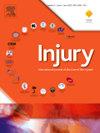在创伤骨科随机对照试验中,不良事件的差异与患者报告的结果测量之间没有相关性:系统综述
IF 2.2
3区 医学
Q3 CRITICAL CARE MEDICINE
Injury-International Journal of the Care of the Injured
Pub Date : 2024-09-17
DOI:10.1016/j.injury.2024.111909
引用次数: 0
摘要
导言:无不良事件的康复是骨科创伤患者的首要任务,但许多随机对照试验(RCT)只能检测到患者报告结果指标(PROMs)的差异。虽然可以认为治疗组间主要不良事件发生率的差异会导致 PROMs 的差异,但这一点尚未得到证实。本研究的目的是对研究性临床试验进行系统性回顾,以评估这些结果的差异是否存在相关性。方法对在线数据库进行系统性检索,以确定报告了主要不良事件和 PROMs 的骨科创伤骨折治疗研究性临床试验。不良事件包括二次手术或可能对长期疗效产生负面影响的并发症(不愈合、慢性区域疼痛综合征等)。评估了不良事件差异(p < 0.05)与 PROMs 差异之间的相关性。70.0%的研究(21/30)的主要结果是连续的 PROM。23.3%(7/30)的研究报告了主要不良事件的差异,6.7%(2/30)的研究报告了 PROMs 的差异。结论在骨科创伤 RCT 中,不良事件发生率的差异与 PROMs 的差异之间没有相关性。研究人员应考虑增强研究的力量,以检测患者和外科医生都希望避免的主要不良事件的差异。本文章由计算机程序翻译,如有差异,请以英文原文为准。
There is no correlation between differences in adverse events and differences in patient-reported outcome measures in orthopaedic trauma randomized controlled trials: A systematic review
Introduction
A recovery without adverse events is a top priority of orthopaedic trauma patients, however many randomized controlled trials (RCTs) are only powered to detect a difference in patient-reported outcome measures (PROMs). While it may be assumed that differences in major adverse event rates between treatment groups will result in differences in PROMs, this has not been established. The purpose of this study was to perform a systematic review of RCTs to evaluate if differences in these outcomes were correlated.
Methods
A systematic search was conducted of online databases to identify RCTs in orthopaedic trauma fracture management that reported both major adverse events and PROMs. Adverse events included secondary surgeries or complications that could negatively affect long-term outcomes (nonunion, chronic regional pain syndrome, etc.). The correlation between a difference (p < 0.05) in adverse events and a difference in PROMs was assessed.
Results
The systematic review yielded 30 RCTs involving 6,769 patients. The primary outcome was a continuous PROM in 70.0 % (21/30). A difference in major adverse events was reported in 23.3 % (7/30) and a difference in PROMs was reported in 6.7 % (2/30). Studies reporting a difference in adverse events, compared to those that did not, were not more likely to report a difference in PROMs (14.3 % (1/7) vs. 4.3 % (1/23); p = 0.42).
Conclusions
There was no correlation between differences in adverse event rates and differences in PROMs in orthopaedic trauma RCTs. Investigators should consider powering studies to detect differences in the major adverse events that both patients and surgeons wish to avoid.
Level of evidence
Level I
求助全文
通过发布文献求助,成功后即可免费获取论文全文。
去求助
来源期刊
CiteScore
4.00
自引率
8.00%
发文量
699
审稿时长
96 days
期刊介绍:
Injury was founded in 1969 and is an international journal dealing with all aspects of trauma care and accident surgery. Our primary aim is to facilitate the exchange of ideas, techniques and information among all members of the trauma team.

 求助内容:
求助内容: 应助结果提醒方式:
应助结果提醒方式:


